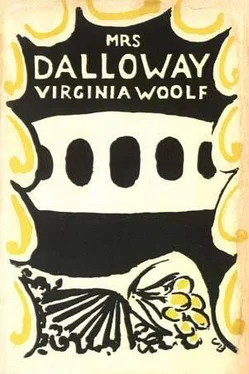Virginia Woolf - Mrs. Dalloway
Здесь есть возможность читать онлайн «Virginia Woolf - Mrs. Dalloway» — ознакомительный отрывок электронной книги совершенно бесплатно, а после прочтения отрывка купить полную версию. В некоторых случаях можно слушать аудио, скачать через торрент в формате fb2 и присутствует краткое содержание. Жанр: Классическая проза, на английском языке. Описание произведения, (предисловие) а так же отзывы посетителей доступны на портале библиотеки ЛибКат.
- Название:Mrs. Dalloway
- Автор:
- Жанр:
- Год:неизвестен
- ISBN:нет данных
- Рейтинг книги:4 / 5. Голосов: 1
-
Избранное:Добавить в избранное
- Отзывы:
-
Ваша оценка:
Mrs. Dalloway: краткое содержание, описание и аннотация
Предлагаем к чтению аннотацию, описание, краткое содержание или предисловие (зависит от того, что написал сам автор книги «Mrs. Dalloway»). Если вы не нашли необходимую информацию о книге — напишите в комментариях, мы постараемся отыскать её.
The story takes place in London on a day in June 1923, a day when Clarissa is giving a dinner party. She walks to the florist shop to buy flowers for the party.
Septimus Warren Smith and his wife Lucrezia happen to be walking on the street. Septimus Warren Smith never meets Mrs. Dalloway, but their lives are connected by external events, such as the sight of an airplane overhead, and by the fact that they are both sensitive people who feel empty.
Richard Dalloway is invited to lunch at the home of Lady Millicent Bruton, a fashionable aristocrat. Lady Bruton dabbles in charities and social reform, and is sponsoring a plan to have young men and women travel to Canada.
Peter Walsh, an old and close friend of Clarissa’s, has returned to England after five years in India, and comes to visit her. Peter Walsh once loved Clarissa, but she had refused to marry him. Clarissa introduces Peter to her daughter Elizabeth.
Elizabeth is 17 years old, and has an older friend and tutor named Doris Kilman. Elizabeth goes to lunch with Miss Kilman. Miss Kilman is poor and physically unattractive, and resents the upper-class Mrs.Dalloway. Miss Kilman is a desperate and fanatically religious woman, who wants to take Elizabeth away from her mother, but conceals her feeling under the guise of religiosity and strident charity.
Septimus Warren Smith commits suicide the same day that Mrs. Dalloway is giving her dinner party.
Sally Seton, a good friend of Clarissa’s whom she has not seen for years, unexpectedly appears at Clarissa’s dinner party. Sally Seton is now Lady Rosseter, and has five sons.
Peter and Sally talk at the party, and Sally wonders if Clarissa is happy. Peter admits that he could never love anyone else as he had loved Clarissa, and as the novel ends he realizes that he feels an extraordinary excitement at seeing her.
Clarissa Dalloway as a character in the novel is upper-class and conventional. She knows her life is shallow; her former lover Peter Walsh had called her the perfect hostess. She feels that her only gift is in knowing people by instinct.
Clarissa is unsure about her daughter’s love for her. She is also unsure about her own feelings toward her husband Richard, and toward her former fiancé Peter Walsh. Her feelings toward Peter are ambivalent; she had loved him, but he had not offered her stability or social standing. She regards Peter as a failure, and it is because he knows this that he bursts into tears when he meets her. She kisses him, and comforts him. Clarissa had refused to marry Peter because of his self-centered unconventionality. She had married Richard, because he was dependable and represented security and stability.
Clarissa loves success, hates discomfort, and has a need to be liked. She is attracted to both men and women (she had fallen in love with her former friend Sally Seton).
Clarissa has had a recent illness, and takes an hour’s rest after luncheon. She thinks about death.
A theme of the novel is the conflict between conventionality and unconventionality. Clarissa chooses conventionality, rather than following her true feelings, and is left empty and unsure of herself. Peter Walsh chooses unconventionality, and is left feeling aimless and unsuccessful. Septimus Warren Smith commits suicide to escape being crushed by the forces of conventionality. The novel is in part a critique of the shallowness and superficial conventionality of upper-class English society.
Another theme of the novel is that the thoughts of individuals are connected in a way that transcends their separation or alienation. Woolf uses a stream-of-consciousness technique to connect the thoughts of her characters. The novel is a continuous narrative, not divided into chapters or sections, although Woolf noted some of the shifts in time or scene by a short blank space in her manuscript. The thoughts of characters such as Mrs. Dalloway and Septimus Warren Smith are connected by external events in the world, such as the sound of a motorcar, or the sight of an airplane in the sky, or the sound of the Big Ben clock as it strikes the hour. Woolf shows that the thoughts of individuals can be connected in a way that reveals a unity in human existence, an exciting world of possibility.












